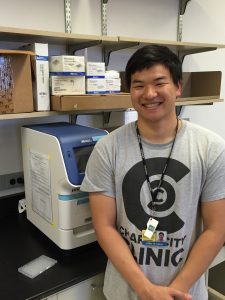“Starting in a new lab has always been difficult for me.”
As a new Johns Hopkins graduate student, James Meixiong, or Jimmy to his friends, describes the challenge in finding the right laboratory fit. “There are a lot of things to navigate in a new lab environment,” he says. “However, it can be an exciting time, as well, for many of the same reasons, an opportunity to learn new things, to meet new people and to be exposed to new ideas.”

As a new incoming graduate student, the challenge for Meixiong will come not only from classwork, but also from the pressures of choosing a lab whose primary investigator will be able to guide and develop his career as a future scientist. This choice is even more important because of the relative permanence of the decision; the average training period for graduate students is six years.
To make the process of choosing a lab smoother, new graduate students get the opportunity to rotate through multiple labs by sampling different departments and mentorship styles. When asked how he approached rotations Meixiong said, “For me, when it came to choosing a lab, I didn’t care as much about the topic. I think many aspects of science are fascinating, and I felt confident that whatever I chose to do my thesis on would have a lot of merit, especially at a place like Hopkins.”
Nevertheless there are a few considerations a new graduate student should look out for when choosing a prospective lab. The lab’s publishing record is one obvious factor, and stable funding is also important; a lab struggling to find funding can become a difficult place to work. When trying to judge the mentoring environment in the lab, you can get an insider’s take by talking with current students and senior postdocs. They will generally be honest in telling you if the lab has a supportive environment or if it’s more competitive.
Meixiong echoes these suggestions, “with there being so many labs, you have to start somewhere to decide which you are going to rotate in. And, for me, I narrowed things down based somewhat on what other mentors, older students and trusted faculty had to say about the lab, as well as things such as the lab publication record and track record when it came to previous students and postdocs.”
Finally, when it comes to searching for the right lab, Meixiong advises, “to not stress so much about finding the ‘perfect lab’ where you are super passionate about the topic and in love with all the people.” Instead, he recommends that you “prioritize getting along and sharing values with the PI and other lab members above all.”